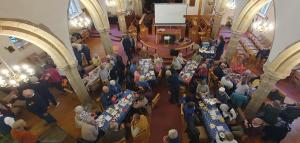Club Meeting at Ashmores
Thu, Mar 17th 2022 at 7:00 pm - 9:00 pm
The Handling and Managing the Covid Pandemic - Sarah Webb (Senior Manager at Public Health England )
Club members please log in for more information.
17th March 2022 Managing the Covid Pandemic – Sarah Webb
Sarah began her talk with a little of her own working background, since she has now retired. Public Health England, NHS and local Government were mentioned, latterly as a Health Emergency Planning Manager. Setting the scene she suggested that two years ago the term ‘pandemic’ was not something that sprang to mind in common use, but then used in the media many times per day. It means: outbreak of infectious disease spread over a number of countries, often where there was little or no immunity known.
Viral diseases are important in the history of pandemics as viruses have the ability to mutate and change and this occasionally results in a disease crossing the species barrier and a new infection for mankind. Examples from the recent past include SARS, MERS, HIV and Ebola. Other changes or variants can result in greater transmissibility. The original Wuhan Covid virus having an ‘R’ of 2.4, compared with Omicron variant at 8.4
Pandemics have been around for as long as humans and have probably played a role in wiping out ancient civilisations, small pox or typhoid likely to have been responsible. More recent pandemics. Include Spanish Flu in 1918 thought to originate in chickens; Russian Flu in 1890 from cattle & more recently in 2009, Swine Flu, derived from pigs in Central America.
She then moved on to the planning regimes for public health emergencies, which bring together the usual organisations of police, fire, ambulances, environment agency and local government who come together as local resilience partnerships meeting regularly to identify risks & plan how to mitigate against such risks. There exists an overarching National Risk Agency, produced by the Cabinet Office.
Public Health England had prepared for a flu pandemic and their first response came on the 8th of January 2020, followed by media frenzy and PM’s daily briefings. The response was supported by various teams: epidemiology, communications, and guidance both clinical & non clinical advising hospitals and prisons. Public H England had 8 of their own labs that quickly became overwhelmed with the demands for testing. The whole operation being led by 4 Incident Directors on rota and a logistics management team.
It was never anticipated that it would last this long, but in the beginning very little was known about this virus, which was quite scary and China were slow in providing much information. No one had ever developed a vaccine against this type of virus and death rates and levels of serious disease presented a major challenge.
Today we are in a very different position, with a great deal of learning achieved and moving into the ‘endemic’ stage, where it is an accepted part of normal, like flu. In the UK work is continuing to try and develop a vaccine against ALL coronaviruses.
Many questions followed, which Sarah comprehensively managed and Adrian thanked Sarah for her very informative and absorbing presentation, she had come highly recommended and had delivered in a fascinating but factual manner that enthralled our members and guests and asked the audience to show their appreciation in the normal manner. AR
'What We Do' Main Pages:

We have now successfully run this event for 10 years. Full reports of each year are available under this main page
more
It's here that you can read what we've been up to in the last few months. For more information on our work in the local community, with our young people and internationally please access "what we do" section of this web site.
more
This is a monthly meeting open to visitors from Bingham, Radcliffe, Cotgrave and all villages in surrounding area.
moreThis committee are involved in planning now we can raise funds for our chosen charities
moreIf you like what we do as an organisation and are interested in volunteering with us, keeping up to date with our plans and future events then why not consider signing up as a friend of our Rotary Club
moreOur International Committee is involved with Polio Plus - a Rotary initiative to eradicate Polio, World-wide; Sand dams; Aqua Boxes; Shelter Boxes; Collecting used spectacles, and many other projects
moreHere you can read about the many meetings we've had during our formation as a Rotary Club. The early years are a little short on detail...
more

.jpg)

